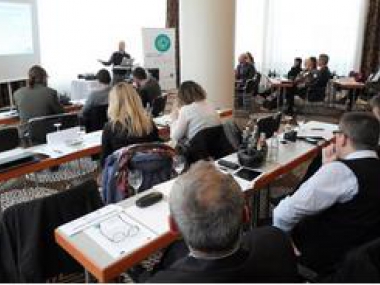The 4D Cities Project Seeks Partnerships Between Health and Knowledge for an Economic Growth
Edited on
09 October 2017The URBACT 4D Cities project led by Igualada (Spain) continues pushing in the field of Health Innovation to turn it into an engine of economic growth for cities. At the last meeting, held in Jena (Germany) on November 7-8, the eight members of the network talked about the role that universities and research, learning and training health centres should develop to make it possible.

How City Councils can promote collaboration between the health system and universities or research centres, how working together may result in new offer of services, how to create knowledge even without specific institutions in place, how to determine the content to disseminate and who is responsible for doing it, what study programmes would be interesting to perform… These are some of the questions discussed, always with the ultimate goal of responding to the needs of citizens and contribute to improving both their welfare and the health system.
This time the cities that shared their best practices with the other partners about knowledge were Tartu and Jena. The city of Tartu presented the Idea Lab aimed at students to develop their projects, and the research oriented Competence Centers, aimed at commercializing their ideas. Jena exposed training programs in the health sector offered by the Ernst Abbe Fachhochschule, at the University of Applied Sciences, and the Company Health Management program, on initiatives undertaken by companies to promote a healthy lifestyle among its employees. Jena also opened their University Hospital and the House of Vision to the 4D Cities representatives so that they can learn about the nursing studies and the ocular diagnosis services, respectively.
The meeting also had the contribution of several experts in the field of knowledge as the Deputy Director of Universities of the Catalan Autonomous Government, Josep Ribas, and Willem van Winden, Lead Expert of the URBACT project EuniverCities, which aims at the co-operation between the city and the university for the development of the knowledge economy.
Finally, they brought together the technical aspects of methodology and preparation of documents such as the revitalization of the Local Support Group, a group of citizens who actively participates in the 4D Cities in each city, and the Local Action Plan, a guide for the local government that will contain the results of the project so that they could be implemented.
The meeting in Jena is the last of the thematic meetings around the four helix: the business sector, citizens’ participation, the health system and knowledge. The next appointment of the 4D Cities’ members will be held in Novara (Italy) in February 2014.
Read more :
- 4D Cities - website
- Special Report: 4D Cities URBACT Project - From Health to Wealth - website
Submitted by admin on
